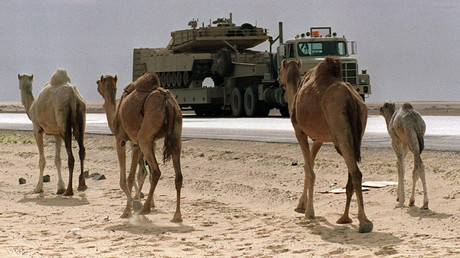‘Saudi Arabia one of top repressive countries’: What’s behind US special ties with Riyadh? -By Rt.com
 |
| U.S. President Barack Obama speaks with Saudi Arabia's King Salman © Kevin Lamarque / Reuters |
Chris Hedges discussed US-Saudi relations with Medea Benjamin.
Saudi Arabia carried out 158 executions, 63 for non-violent drug crimes last year, often through public beheadings. Early this year, it executed 47 men for terrorism-related offenses, including the prominent Shia cleric Sheikh Nimr al-Nimr. It practices gender apartheid against women, who are not allowed to drive, are banned from most jobs, and are controlled by male guardians. It prohibits freedom of expression, including freedom of religion. Homosexuals can be put to death.
It promotes a fundamentalist form of Sunni Islam throughout the Muslim world known as Wahhabism, which sanctifies violence against those considered infidels or apostates, including Sufis and Shiites. The autocratic Saudi royal family, whose wealth is estimated at 1.4 trillion dollars, lives in unimaginable extravagance, and often decadence. Yet Saudi Arabia is considered one of the US’ closest allies in the Middle East.
RT: Let's talk about this special relationship with Saudi Arabia, especially in light of the fact, as you point out in the book, the US now takes only 13 percent of Saudi oil…
Medea Benjamin: Yes, certainly the relationship was started out on the basis of oil when the Saudi Kingdom was first established in 1932, then oil was discovered in the 1930s, and then for 12 different administrations, Republican and Democrat, a close relationship with the Saudis based on oil. But as the years went by, the US produced more of its own oil, imported more from Canada, and so oil is not as important as it was. The US wants to be able to control where that oil goes to other countries. But the relationship has really started to shift in terms of what is the big focus, and I think the big focus is now that they have become the number one purchaser of US weapons by far. $115 billion over the last eight years – that is just under the Obama administration alone. It is a staggering sum, and it is amazing that it has been 43 different deals just under the Obama administration, and Congress has just rubber-stamped every single one.
RT: What about Saudi society? Give us a profile what Saudi Arabia is like.
MB: One of the most repressive countries in the world, where there is no freedom of assembly, freedom of speech, no political parties, no unions allowed, where dissent is treated as treason. You can be beheaded for insulting Islam, for insulting the King, for spreading atheism, for being convicted of being a homosexual, for sorcery. There is discrimination against entire groups of people like women who are not only forced to fully cover in public, it is the only country where women aren't allowed to drive. A guardianship system where women have to have a male legal guardian from the day they're born to the day they die. It is the most sex-segregated society in the world. Immigrant population, which is huge – of a 30 million population, 10 million are migrant workers, many of whom are coming from some of the poorest countries in the world and are treated like indentured servants.
RT: Let’s talk about how they are treated.
MB: First, let's say slavery was only eliminated in 1962 in Saudi Arabia, and with this huge oil money that has flooded the country, many people, including middle-class Saudis, have used the money to bring in foreign workers and it is a sponsorship program. You can't just say: “I'm from the poor country in Bangladesh, I am going to go try my luck in Saudi Arabia.”. You have to have a sponsor, and the sponsor then becomes like your owner – you couldn't even leave the country if you don't get permission from your employer. And you're treated like an indentured servant. You have no redress, you have no ability to fight back, the only thing you can do is try to contact your embassy, and good luck if they're going to come to your town...
RT: Let's talk about Yemen. Saudi Arabia has sealed off the country, they are using cluster bombs, they are attacking power plants, water purification plants, schools, factories that make potato chips, health clinics, they have just bombed a mourning hall. What are they doing there?
MB: They took the country that was already one of the poorest in the Arab world and they have turned it into a catastrophic situation. We count the 10,000 plus people who have died but it is way more than that if you look at people who have died because they can't get food and they can't get medicine. And 80 percent of the population now is depending on humanitarian aid, they import most of their food and they can't get it in. There is a blockade that the Saudis are imposing, so this is just a catastrophic situation.
RT: What is this relentless bombing campaign of Yemen about?
MB: It's all about their nemesis with the Iranians and their fear that the tribal group, Houthis, that is closer to the Shia, they fear that this will give the Iranians a inroad on their border, and this is all about fighting Iran through a proxy war with US weapons, with US logistical support, with US refueling their planes in the air, with US intelligence and with US diplomatic cover.
The statements, views and opinions expressed in this column are solely those of the author and do not necessarily represent those of RT.
Source Rt.com





No comments:
Post a Comment
Note: only a member of this blog may post a comment.